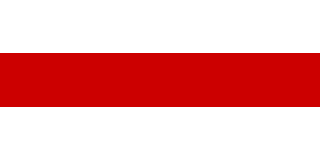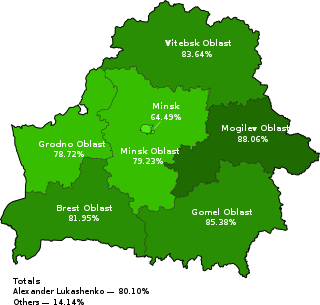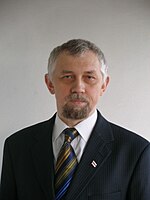
Alexander Grigoryevich Lukashenko is a Belarusian politician who has been the president of Belarus since the office's establishment in 1994, making him the current longest-serving head of state in Europe.

The BPF Party is a banned political party in Belarus. It was de facto established after the split of the social movement Belarusian Popular Front in 1999. The Belarusian Popular Front was founded during the Perestroika era by members of the Belarusian intelligentsia, including Vasil Bykaŭ. Its first and most charismatic leader was Zianon Pazniak.

Belarus elects on national level a head of state—the president—and a legislature. The president is elected for a five-year term by the people. The National Assembly has two chambers. The House of Representatives has 110 members elected in single-seat constituencies elected for a four-year term. The Council of the Republic has 64 members, 56 members indirectly elected and eight members appointed by the president.

The Conservative Christian Party of the Belarusian People's Front is a former political party in Belarus that opposes the government of president Alexander Lukashenko. It was de facto formed after the split of the Belarusian People's Front in 1999.

The Belarusian Popular Front "Revival" was a social and political movement in Belarus in the late 1980s and 1990s whose goals were national revival of Belarus, its democratization and independence from the Soviet Union. Its leader was Zianon Pazniak. It was similar to the Popular Fronts of Latvia and Estonia, and the Sąjūdis movement in Lithuania.

A four-question referendum was held in Belarus on 14 May 1995, alongside parliamentary elections. The four issues were the possibility of giving the Russian language equal status with Belarusian, whether new national symbols should be adopted, whether there should be economic integration with Russia and changes to the constitution that would allow early elections if Parliament systematically violated the constitution. According to official results, all four were approved by at least three-quarters of voters, with a turnout of 64.8%.

A seven-question referendum was held in Belarus on 24 November 1996. Four questions were put forward by President Alexander Lukashenko on changing the date of the country's independence day, amending the constitution, changing laws on the sale of land and the abolition of the death penalty. The Supreme Council put forward three questions on constitutional amendments by the Communist and Agrarian factions, local elections and the national finances.

Presidential elections were held in Belarus on 23 June 1994, with a second round on 10 July. They were the first national elections held in Belarus since the country seceded from the Soviet Union three years earlier. The result was an overwhelming victory for Alexander Lukashenko, who received 81% of the vote in the second round. Voter turnout was 79% in the first round and 71% in the second.
Syamyon Georgiyevich Sharetski is a Belarusian former agricultural scientist and politician. He was the last acting Chairman of the Supreme Soviet of Belarus.

The Belarusian opposition consists of groups and individuals in Belarus seeking to challenge, from 1988 to 1991, the authorities of Soviet Belarus, and since 1995, the leader of the country Alexander Lukashenko, whom supporters of the movement often consider to be a dictator. Supporters of the movement tend to call for a parliamentary democracy based on a Western model, with freedom of speech and political and religious pluralism.

Belarusian nationalism refers to the belief that Belarusians should constitute an independent nation. Belarusian nationalism began emerging in the mid-19th century, during the January Uprising against the Russian Empire. Belarus first declared independence in 1917 as the Belarusian Democratic Republic, but was subsequently invaded and annexed by the Russian Soviet Federative Socialist Republic in 1918, becoming part of the Soviet Union. Belarusian nationalists both collaborated with and fought against Nazi Germany during World War II, and protested for the independence of Belarus during the late 1980s and early 1990s.

Presidential elections were held in Belarus on Sunday, 9 August 2020. Early voting began on 4 August and ran until 8 August.

Viktar Dzmitryevich Babaryka is a Belarusian banker, philanthropist, public and opposition political figure who intended to become a candidate in the 2020 Belarusian presidential election. He is considered a political prisoner after having his candidacy rejected, followed by being detained by the Belarusian government over charges of "illegal [financial] activities"; charges that are considered to be politically motivated.
Events in the year 2020 in Belarus.

Hanna Anatolyeuna Kanapatskaya or Anna Anatolyevna Kanopatskaya is a Belarusian politician, former MP, lawyer, entrepreneur and candidate in the 2020 Belarusian presidential election. She is also a former parliamentary deputy, represented the United Civic Party of Belarus from 1995 to 2019 and served as an MP from 2016 to 2019. She is known for her political campaign on calling Belarus to be freed from Russian interference.
The 1991 Belarusian strikes, also referred to in Belarus as the April Strikes, were a series of nationwide strikes and rallies in the Byelorussian Soviet Socialist Republic. Originally in opposition to price increases and a tax on goods from republics sold in another republic, the protests later turned into a broadly anti-Soviet movement, calling for the resignation of Soviet leadership, a reduction of the economic role of the Soviet government, and fresh elections to the Supreme Soviet of the Byelorussian Soviet Socialist Republic.
The "Minsk Spring" or "Belarusian Spring" was a series of mass street protests in 1996 and 1997 against the increasingly-authoritarian rule of President Alexander Lukashenko.

The 1999 Belarusian presidential election was a political protest action by members of Belarusian opposition who did not recognise the 1996 constitutional reform which extended Alexander Lukashenko's presidential term.
Events of the year 2023 in Belarus.

Aleh Anatolievich Trusaŭ is a Belarusian historian, archaeologist, politician, and social activist. He is one of the founders of the BPF Party and the Belarusian Social Democratic Assembly, both of which are organizations and parties with a national and independence-oriented character. From 1990 to 1995, he was a deputy to the Supreme Soviet of the Byelorussian Soviet Socialist Republic/Supreme Council of Belarus of the 12th convocation and a member of the BPF Party parliamentary opposition faction. He holds the academic title of Candidate of Sciences and is a historian specializing in Belarusian architecture. Since 1999, he has been the chairman of the Francišak Skaryna Belarusian Language Society.











